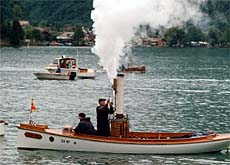New pollutants prove hazardous for alpine lakes

A new survey has found that animal life in remote alpine regions is being threatened by breakdown-resistant pollutants.
Despite a ban on old-style pollutants, new contaminants are finding their way from industrial sites into high altitude lakes- some of which are in Switzerland.
The new study, by the environmental organisation, Greenpeace, has found high levels of persistent organic pollutants (POPs) in fish and animals in high mountain areas.
One such example was in Austria’s Lake Schwarzee ob Soelden – Europe’s highest lake at 9,185 feet – where fatty tissue in Arctic char fish was found to contain as much where 911 microgrammes of pollutants per kilogram.
Implications
These results have implications for Switzerland. A recent European Union survey into pollution in 19 mountain lakes in Western Europe showed that the highest lakes, some of which were Swiss, had the highest concentration of POPs.
Two lakes, the Hagelsee and the Jorisee, were included in the research, a joint project between 13 countries, which included Swiss contributions from the Swiss federal institute for environmental science and technology in Dubendorf, Zurich University, and the environmental studies laboratory in Lugano.
Greenpeace’s toxics expert Manfred Krautter believes that, contrary to popular belief, water sources in Switzerland may not be devoid of carcinogenic chemicals.
“The higher the mountain, the colder the temperature, the more environmental pollutants are ending up there,” he told swissinfo.
New-style POPs
Krautter says that new POPs are produced by heavy industries in North America and Europe.
According to Greenpeace, these pollutants are mainly replacements for earlier POPs banned by the United Nations last year.
The main POPs found in the survey were chemicals used as flame retardants in computers and other electrical equipment and chloroparaffins manufactured as sealants and cable coverings.
Global distillation
Krautter says that POPs get into the atmosphere via the “global distillation effect”. After evaporating in the atmosphere in warmer regions, POPs then travel for thousands of miles as part of weather system before freezing over colder areas.
They then fall as polluted snow. The lower temperatures in these areas stop the POPs from breaking down, which results in a high concentration of pollutants in the food chain.
“These substances are slowly evaporating from the product – they do not come from the industrial sites themselves,” Krautter told swissinfo.
“Since they are so persistent, they move through the atmosphere for hundreds and thousands of miles. They often end up in remote areas.”
Chronically toxic
Many POPs are known to be toxic and once in the food chain they can cause cancer and can damage the human immune system and affect fertility in the long-term.
According to Krautter, mothers in Greenland have 30 times more pollutants in their breast milk than their counterparts in Central Europe as a result of exposure to POPs through eating fish and seal meat from the icy waters of the Arctic Ocean.
Greenpeace is calling for an international ban on new persistent pollutants. The environmental organisation also wants the EU to make the licensing of hazardous chemicals obligatory, because at present only new substances have to be registered.
Krautter maintains that continues that alternatives to POPs are already available.
For him, the only way to stop the spread of these pollutants is to stop using them altogether.
swissinfo, MaryAnn Mathew and Sally Mules
New organic pollutants are used in PCs and other electrical appliances.
They have been developed to replace older banned pollutants.
They are carried by weather systems and fall as polluted snow.
High-altitude lakes are worst affected.

In compliance with the JTI standards
More: SWI swissinfo.ch certified by the Journalism Trust Initiative
You can find an overview of ongoing debates with our journalists here . Please join us!
If you want to start a conversation about a topic raised in this article or want to report factual errors, email us at english@swissinfo.ch.